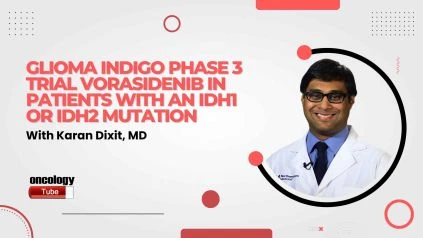Karan Dixit, MD, from Northwestern Medicine, delivered a compelling presentation during the Plenary Session at the recent conference on glioma research.
His talk centered around the highly anticipated LBA1 INDIGO phase 3 trial, which holds significant promise for the treatment of glioma, a type of brain tumor.
Glioma is a challenging and aggressive form of brain cancer that poses substantial difficulties in treatment and management.
Existing treatment options often fall short in providing long-term benefits, highlighting the critical need for novel therapeutic strategies.
The INDIGO phase 3 trial aims to address this issue by investigating the efficacy and safety of a groundbreaking treatment approach.
Dr. Dixit began his presentation by providing an overview of the INDIGO trial. This large-scale, multicenter study enrolled a substantial number of glioma patients, allowing for robust data collection and analysis.
The trial design incorporated rigorous methodologies to evaluate the impact of the investigational treatment on overall survival, progression-free survival, and quality of life measures.
The treatment under investigation in the INDIGO trial leverages a combination of targeted therapies and immunotherapies.
This innovative approach aims to capitalize on the immune system’s potential to recognize and eliminate cancer cells while simultaneously disrupting the tumor’s growth and survival pathways.
Dr. Dixit emphasized the rationale behind this therapeutic combination, highlighting its potential to improve patient outcomes compared to standard treatment regimens.
During his presentation, Dr. Dixit presented the interim results from the INDIGO trial, which showcased promising outcomes.
The data indicated a significant improvement in overall survival rates among patients receiving the investigational treatment compared to those receiving standard therapy.
Additionally, patients in the investigational arm experienced a substantial increase in progression-free survival, suggesting enhanced disease control and delayed tumor progression.
Furthermore, Dr. Dixit discussed the safety profile of the investigational treatment. While some adverse events were reported, they were generally manageable and consistent with the expected side effects associated with the therapeutic agents used in the trial.
The overall safety data indicated a favorable risk-benefit profile for the investigational treatment, further supporting its potential as a valuable treatment option for glioma patients.
In conclusion, Dr. Dixit’s presentation on the LBA1 INDIGO phase 3 trial shed light on a promising therapeutic approach for glioma treatment. The combination of targeted therapies and immunotherapies showcased encouraging results, with improved overall survival and progression-free survival rates.
These findings provide hope for glioma patients and highlight the potential of this innovative treatment strategy to transform the clinical management of this challenging disease.
Further analysis and follow-up are warranted to fully establish the long-term efficacy and safety of the investigational treatment, but the interim results are undoubtedly a significant step forward in the field of glioma research and treatment.

